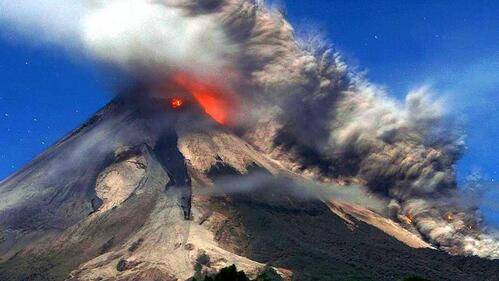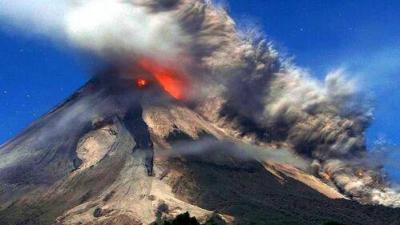The National Institute of Meteorology has clarified the debate regarding the effects of the Mount Etna volcano in eastern Sicily, Italy, on air quality in Tunisia, stating that there is no negative impact of the volcano's activity on Tunisian areas, despite its proximity of about 450 kilometers to northern Tunisia. The meteorological institute confirmed that daily measurements show Tunisia remains within safe limits, and measurements from the European Centre indicated that the sulfur dioxide gas emitted by the volcano remains far from the ground and has no impact on Tunisia.
Air quality monitoring stations indicated that sulfur dioxide levels at ground level remained low and nearly nonexistent from July 3 to July 7, 2024, coinciding with the onset of volcanic activity in Sicily. Environmental engineer and climate change expert Hamadi Hachach stated in an interview with Sky News Arabia that the rumors circulating in Tunisia regarding the impact of gas emissions from Mount Etna on air quality are unfounded. He explained that sulfur dioxide activity was detected in eastern Libya in the cities of Derna and Benghazi, and in Marsa Matrouh, Egypt, before moving eastward due to winds towards the Libyan coast and Tripoli, raising speculation about the arrival of sulfur gases in Tunisia, which did not occur due to the weak concentration of gases that reached neighboring cities.
Regarding the potential impact of volcanic activity in Italy on the coasts of Tunisia, the environmental expert confirmed that volcanic activity has no direct impact on the sea, unlike seismic activity. He noted that Mount Etna is not classified as a violent volcano that could cause earthquakes, and current monitoring confirms that it is emitting toxic sulfur oxide gas that is gradually dissipating. Hachach pointed out that the Italian volcano could return to more violent activity in the coming years.
In this context, geography professor and researcher in natural hazards Amer Bahbeha confirmed that the speculation regarding the possibility of ocean currents causing drowning incidents due to the Italian Mount Etna is baseless. He added that the volcano near the coasts of the Nabeul governorate in Tunisia is one of the most active volcanoes in the world for thousands of years and resumed activity on July 3, 2024, after four years of dormancy, releasing jets of hot lava that covered the sky with black smoke and ash, causing panic in Sicily and concerns for neighboring countries, including Tunisia.




